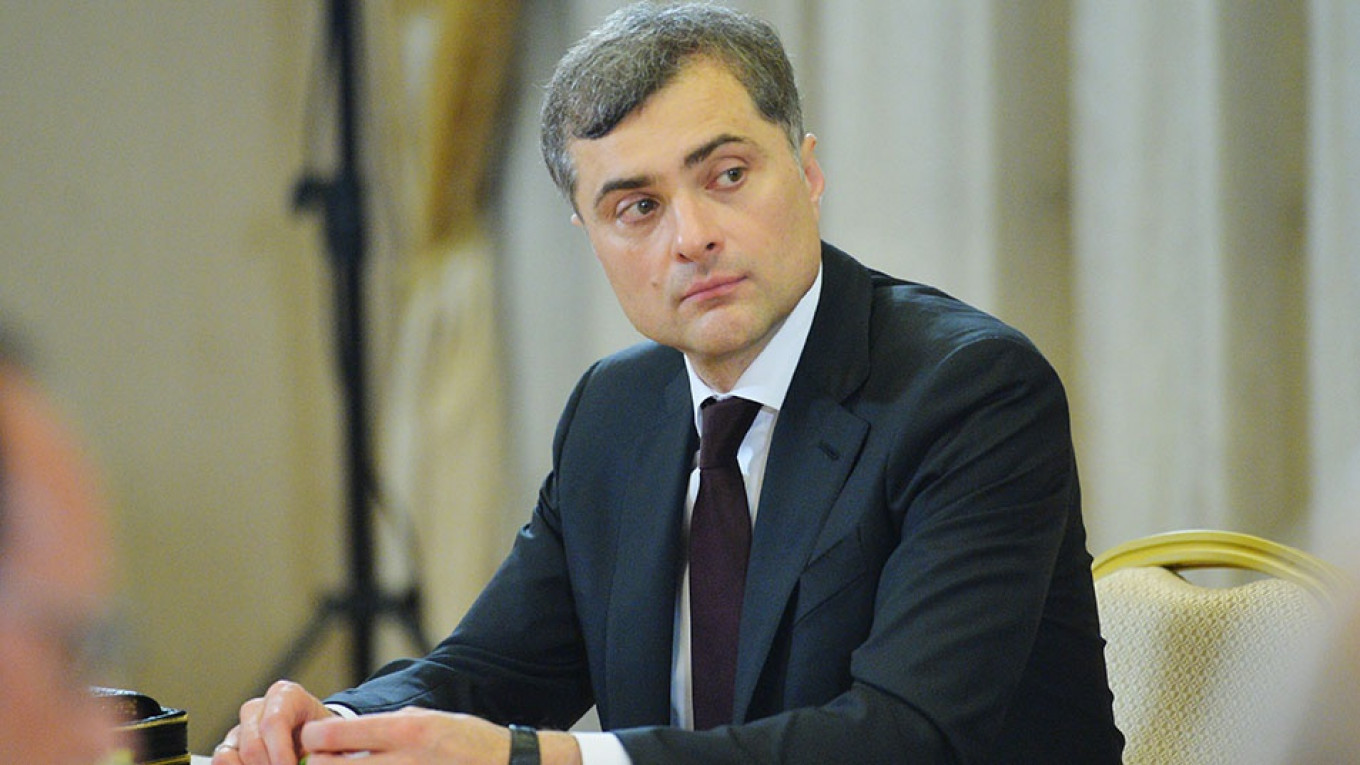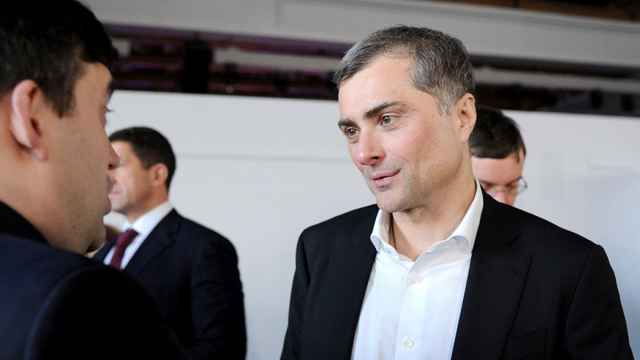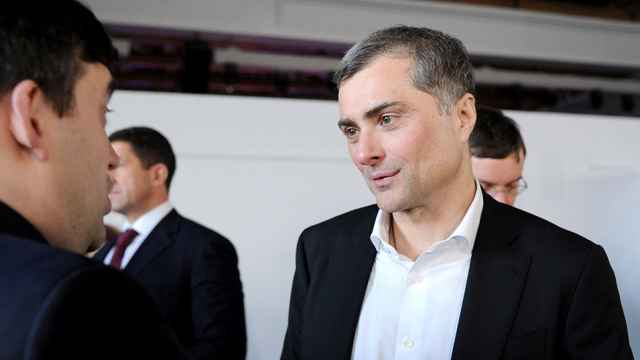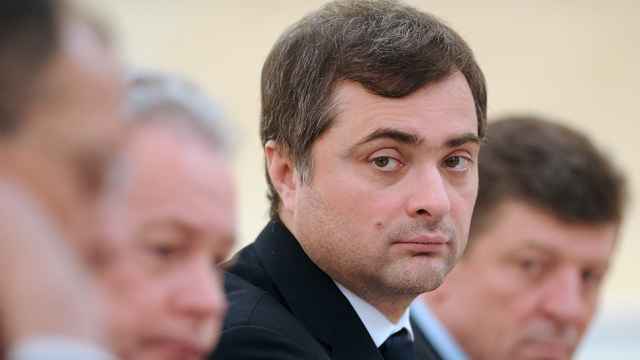Stop all the clocks, cut off the telephone, for the news is confirmed: Vladislav Surkov, once Putin’s “grey cardinal,” not so much his political technologist as political theatrician, is gone.
It was perhaps a bitter irony that the elegantly prolix Surkov was dismissed on 18 February with one of the briefest and bluntest of edicts, a two-line epitaph that simply decreed:
“1. To dismiss Surkov Vladislav Yuryevich from the post of Assistant to the President of the Russian Federation.
“2. This Decree shall enter into force on the day of its signing.”
Of course, Surkov may be back — he has engineered an at least partial resurrection before.
However, with even those close to him hinting that he himself walked out, over the appointment of Dmitry Kozak as Donbass proconsul-in-chief, it may well be that his lives are spent. After all, Putin values the “good soldier” who uncomplainingly accepts a tough fate.
This may lead to movement on the Donbass, although so far the movement has largely been of trigger fingers.
But it likely also says something about Putinism, making the final end of its fluid, postmodern, imaginative, too-clever-by-half aspects, all of which were inextricably and unavoidably connected with Surkov.
This was, after all, the man who would gladly sing the praises of American rapper Tupac Shakur and beat poet Allen Ginsberg, even when official tastes were swinging back to a nationalist canon of home-grown patriots and Great Patriotic War epics. The political operator who invented the term “Sovereign Democracy,” in the full knowledge that it meant nothing but sounded like much. The theatre director who treated political parties and leaders as actors on a set of his own devising.
His was the early Putinism, when the anarchy of the 1990s were still energizing the new state-building campaign, a time when, in Peter Pomerantsev’s words, “nothing is true but everything is possible.”
In Rashomon Russia, Putin could mirror everyone’s hopes and dreams, and breathless hype could seem to replace sober debate. Surkov was able to make the state, in the words of the novel Almost Zero (that he seems to have written under the pseudonym Natan Dubovitsky), “at any moment ready to perform tragedy, or pastoral, or something of ambiguity.”
Surkov was the impresario of early Putinism, his political dramaturgiya fuelled by a buoyant economy and a public mood willing to be dazzled and distracted while they enjoyed an unprecedented dolce vita.
He was also perennially too smart for his own good, or not quite as smart as he thought, depending on to whom you spoke.
After all, what was there beyond the showmanship, the dangerous promise of always being able to pull yet another white rabbit out of his top hat?
United Russia, the very embodiment of sovereign democracy, is tanking, its brand so tarnished that its candidates in last year’s Moscow council elections preferred to stand under the guise of independents. The Donbass pseudo-states turned out both impossible to control with his brand of promise, threat and cajolery, and also impossible to sell as real entities, let alone victims of Ukrainian prejudice, to a skeptical and hostile West.
Reportedly, he was also one of the men who sold that raging bull Ramzan Kadyrov to Putin, and in the process saddled Russia with a virtually autonomous bandit kingdom that it has to bankroll.
This was, perhaps, the essence of Surkovism. He was the front man, the circus barker who could promise the greatest show on Earth, but not himself deliver it. For that he depended on the grey men behind him, the very managers and administrators he implicitly patronised. Alone, he was all Potemkin, no battleships.
So perhaps it is not that he failed, but that the Kremlin failed him.
It never truly engaged with the fictional democratic structures it had created, allowing them to atrophy into embarrassing irrelevance. It failed ever to make a definite decision on just what it wanted to do with the Donbas, preferring to put its faith in a Ukrainian capitulation always just around the corner. It never appreciated that virtual politics needed some real politics behind it.
Surkov’s time is over, though. Late Putinism is about a different, safer kind of spectacle. It is about Key Performance Indicators (KPIs), Great Patriotic War cavalcades, and a more discreet kind of embezzlement for a more discreet kind of VIP. The appointment of Kozak, the tried-and-tested trouble-shooter, as his replacement in the Donbas is a particular signal of this preference for managerialism.
Policy increasingly becomes driven by long-term security, for the Putin and for his clan, in a time of uncertainty. The godfather may well still push forward grand designs, such as his metrics-driven National Projects and his constitutional revisions, but these are essentially conservative measures, attempts to hold back the crimson tide of history rather than to make it.
It is the retrenchment of the regime into sensible, grey, technocracy; the age of the impresario and the illusionist is over, the kleptocrat and the KPIocrat have won.
And yet, as he looks at the metropolis’s bright city lights through the rear window, Surkov can perhaps reflect that, just as his infamous manifesto-article of last year tried to claim that “Putinism” held the “political algorithm” that was defining modern times, in fact the experience of the West may suggest it is actually “Surkovism,” fantasy politics, that is “the ideology of the future.”
A Message from The Moscow Times:
Dear readers,
We are facing unprecedented challenges. Russia's Prosecutor General's Office has designated The Moscow Times as an "undesirable" organization, criminalizing our work and putting our staff at risk of prosecution. This follows our earlier unjust labeling as a "foreign agent."
These actions are direct attempts to silence independent journalism in Russia. The authorities claim our work "discredits the decisions of the Russian leadership." We see things differently: we strive to provide accurate, unbiased reporting on Russia.
We, the journalists of The Moscow Times, refuse to be silenced. But to continue our work, we need your help.
Your support, no matter how small, makes a world of difference. If you can, please support us monthly starting from just $2. It's quick to set up, and every contribution makes a significant impact.
By supporting The Moscow Times, you're defending open, independent journalism in the face of repression. Thank you for standing with us.
Remind me later.








